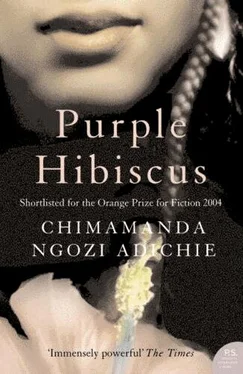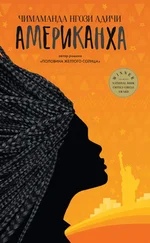Чимаманда Адичи - Purple hibiscus
Здесь есть возможность читать онлайн «Чимаманда Адичи - Purple hibiscus» — ознакомительный отрывок электронной книги совершенно бесплатно, а после прочтения отрывка купить полную версию. В некоторых случаях можно слушать аудио, скачать через торрент в формате fb2 и присутствует краткое содержание. Год выпуска: 2003, ISBN: 2003, Издательство: Algonquin Books of Chapel Hill, Жанр: Современная проза, на английском языке. Описание произведения, (предисловие) а так же отзывы посетителей доступны на портале библиотеки ЛибКат.
- Название:Purple hibiscus
- Автор:
- Издательство:Algonquin Books of Chapel Hill
- Жанр:
- Год:2003
- ISBN:1-56512-387-5
- Рейтинг книги:5 / 5. Голосов: 1
-
Избранное:Добавить в избранное
- Отзывы:
-
Ваша оценка:
- 100
- 1
- 2
- 3
- 4
- 5
Purple hibiscus: краткое содержание, описание и аннотация
Предлагаем к чтению аннотацию, описание, краткое содержание или предисловие (зависит от того, что написал сам автор книги «Purple hibiscus»). Если вы не нашли необходимую информацию о книге — напишите в комментариях, мы постараемся отыскать её.
Purple hibiscus — читать онлайн ознакомительный отрывок
Ниже представлен текст книги, разбитый по страницам. Система сохранения места последней прочитанной страницы, позволяет с удобством читать онлайн бесплатно книгу «Purple hibiscus», без необходимости каждый раз заново искать на чём Вы остановились. Поставьте закладку, и сможете в любой момент перейти на страницу, на которой закончили чтение.
Интервал:
Закладка:
Aunty Ifeoma drove us to the dusty village about two hours away. I sat in the back with Father Amadi, separated from him by the space in the middle. He and Amaka sang as we drove; the undulating road made the car sway from side to side, and I imagined that it was dancing. Sometimes I joined in the singing, and other times I remained quiet and listened, wondering what it would feel like if I moved closer, if I covered the space between us and rested my head on his shoulder. When we finally turned into the dirt road with the hand painted sign that read welcome to aokpe apparition ground, all I saw at first was chaos. Hundreds of cars, many bearing scrawled signs that read catholics on pilgrimage, jostled to fit into a tiny village that Aunty Ifeoma said had not known as many as ten cars until a local girl started to see the vision of the Beautiful Woman. People were packed so close that the smell of other people became as familiar as their own. Women crashed to their knees. Men shouted prayers. Rosaries rustled. People pointed and shouted, "See, there, on the tree, that's Our Lady!" Others pointed at the glowing sun. "There she is!" We stood underneath a huge flame-of-the-forest tree. It was in bloom, its flowers fanning out on wide branches and the ground underneath covered with petals the color of fire. When the young girl was led out, the flame-of-the-forest swayed and flowers rained down. The girl was slight and solemn, dressed in white, and strong-looking men stood around her so she would not be trampled. She had hardly passed us when other trees nearby started to quiver with a frightening vigor, as if someone were shaking them. The ribbons that cordoned off the apparition area shook, too. Yet there was no wind. The sun turned white, the color and shape of the host. And then I saw her, the Blessed Virgin: an image in the pale sun, a red glow on the back of my hand, a smile on the face of the rosary-bedecked man whose arm rubbed against mine. She was everywhere. I wanted to stay longer, but Aunty Ifeoma said we had to leave, because it would be impossible to drive out if we waited until most people were leaving. She bought rosaries and scapulars and little vials of holy water from the vendors as we walked to the car. "It doesn't matter if Our Lady appeared or not," Amaka said, when we got to the car. "Aokpe will always be special because it was the reason Kambili and Jaja first came to Nsukka."
"Does that mean you don't believe in the apparition?" Father Amadi asked, a teasing lilt in his voice.
"No, I didn't say that," Amaka said.
"What about you? Do you believe it?" Father Amadi said nothing; he seemed to be focused on rolling the window down to get a buzzing fly out of the car. "I felt the Blessed Virgin there. I felt her," I blurted out. How could anyone not believe after what we had seen? Or hadn't they seen it and felt it, too?
Father Amadi turned to study me; I saw him from the corner of my eye. There was a gentle smile on his face. Aunty Ifeoma glanced at me, then turned back and faced the road. "Kambili is right," she said. "Something from God was happening there."
I went with Father Amadi to say his goodbyes to the families on campus. Many of the lecturers' children clung tightly to him, as if the tighter they held him, the less likely he could break free and leave Nsukka. We did not say much to each other. We sang Igbo chorus songs from his cassette player. It was one of those songs-"Abum onye n'uwa, onye ka m bu n'uwa" — that eased the dryness in my throat as we got into his car, and I said, "I love you." He turned to me with an expression that I had never seen, his eyes almost sad. He leaned over the gear and pressed his face to mine. I wanted our lips to meet and hold, but he moved his face away.
"You are almost sixteen, Kambili. You are beautiful. You will find more love than you will need in a lifetime," he said. And I did not know whether to laugh or cry. He was wrong. He was so wrong.
As he drove me home, I looked out of the open window at the compounds we drove past. The gaping holes in the hedges had closed up, and green branches snaked across to meet each other. I wished that I could see the backyards so I could occupy myself with imagining the lives behind the hanging clothes and fruit trees and swings. I wished I could think about something, anything, so that I would no longer feel. I wished I could blink away the liquid in my eyes. When I got back, Aunty Ifeoma asked if I was all right, if something was wrong. "I'm fine, Aunty," I said. She was looking at me as though she knew I was not fine. "Are you sure, nne?"
"Yes, Aunty."
"Brighten up, inugo? And please pray for my visa interview. I will leave for Lagos tomorrow."
"Oh," I said, and I felt a new, numbing rush of sadness. "I will, Aunty." Yet I knew that I would not, could not, pray that she get the visa. I knew it was what she wanted, that she did not have many other choices. Or any other choices. Still, I would not pray that she get the visa. I could not pray for what I did not want. Amaka was in the bedroom, lying in bed, listening to music with the cassette player next to her ear. I sat on the bed and hoped she would not ask me how my day with Father Amadi had gone. She didn't say anything, just kept nodding to the music.
"You are singing along," she said after a while.
"What?"
"You were just singing along with Fela."
"I was?" I looked at Amaka and wondered if she was imagining things. "How will I get Fela tapes in America, eh? Just how will I get them?" I wanted to tell Amaka that I was sure she would find Fela tapes in America, and any other tapes that she wanted, but I didn't. It would mean I assumed that Aunty Ifeoma would get the visa-and besides, I was not sure Amaka wanted to hear that.
My stomach was unsteady until Aunty Ifeoma came back from Lagos. We had been waiting for her on the verandah, although there was power and we could have been inside, watching TV. The insects did not buzz around us, perhaps because the kerosene lamp was not on or perhaps because they sensed the tension. Instead, they flitted around the electric bulb above the door, making surprised thuds when they bumped against it. Amaka had brought the fan out, and its whir created music with the hum of the refrigerator inside.
When a car stopped in front of the flat, Obiora jumped up and ran out. "Mom, how did it go? Did you get it?"
"I got it," Aunty Ifeoma said, coming onto the verandah.
"You got the visa!" Obiora screamed, and Chima promptly repeated him, rushing over to hug his mother.
Amaka and Jaja and I did not stand; we said welcome to Aunty Ifeoma and watched her go inside to change. She came out soon, with a wrapper tied casually around her chest. The wrapper that stopped above her calves would stop above the ankles of an average-size woman. She sat down and asked Obiora to get her a glass of water.
"You do not look happy, Aunty," Jaja said.
"Oh, nna m, I am. Do you know how many people they refuse? A woman next to me cried until I thought that blood would run down her cheeks. She asked them, 'How can you refuse me a visa? I have shown you that I have money in the bank. How can you say I will not come back? I have property here, I have property.' She kept saying that over and over: I have property.' I think she had wanted to attend her sister's wedding in America."
"Why did they refuse her?" Obiora asked.
"I don't know. If they are in a good mood, they will give you a visa, if not, they will refuse you. It is what happens when you are worthless in somebody's eyes. We are like footballs that they can kick in any direction they want to."
"When are we leaving?" Amaka asked, tiredly, and I could tell that right now she did not care about the woman who had nearly cried blood or about Nigerians being kicked around or about anything at all.
Aunty Ifeoma drank the whole glass of water before speaking. "We have to move out of this flat in two weeks. I know they are waiting to see that I don't, so they can send security men to throw my things out on the street."
Читать дальшеИнтервал:
Закладка:
Похожие книги на «Purple hibiscus»
Представляем Вашему вниманию похожие книги на «Purple hibiscus» списком для выбора. Мы отобрали схожую по названию и смыслу литературу в надежде предоставить читателям больше вариантов отыскать новые, интересные, ещё непрочитанные произведения.
Обсуждение, отзывы о книге «Purple hibiscus» и просто собственные мнения читателей. Оставьте ваши комментарии, напишите, что Вы думаете о произведении, его смысле или главных героях. Укажите что конкретно понравилось, а что нет, и почему Вы так считаете.






![О Генри - Пурпурное платье [The Purple Dress]](/books/405339/o-genri-purpurnoe-plate-the-purple-dress-thumb.webp)





